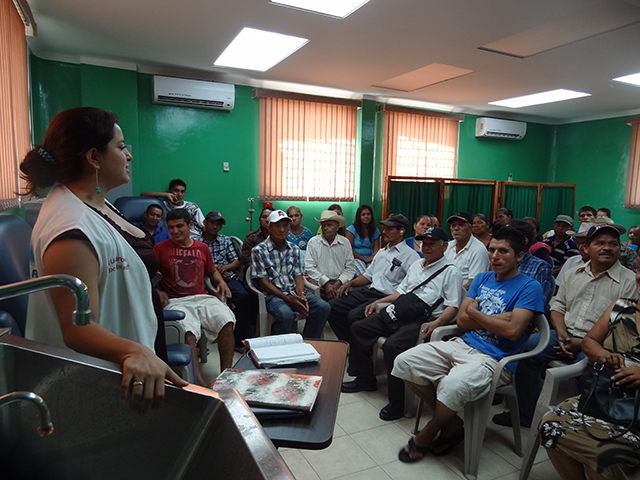
Truthout is a vital news source and a living history of political struggle. If you think our work is valuable, support us with a donation of any size.
El Salvador is struggling with a growing health epidemic among its rural residents: Chronic Kidney Disease (CKD). In 2008, the country registered the world’s highest mortality rate from kidney failure. Over 3,000 people died from CKD between just January 2010 and July 2014. Doctors diagnose 60 new cases each month.
 Ministry of Health poster hanging on wall of specialized clinic in Ciudad Romero. Distinguishes between traditional and non-traditional kidney disease. (Photo: Emma Lawlor)
Ministry of Health poster hanging on wall of specialized clinic in Ciudad Romero. Distinguishes between traditional and non-traditional kidney disease. (Photo: Emma Lawlor)
Traditionally, CKD is a secondary effect of diabetes or hypertension. In the early 2000s, Central Americans began noticing significant numbers of CKD cases among otherwise healthy agricultural workers and rural residents. Researchers believe this new form ofkidney disease is caused by some combination of agrochemicalexposure and dehydration. Yet the only consensus is that the causes are complicated, likely multifactorial, and stem from the entrenched inequalities and poverty that affect rural Central America.
While medical and public health researchers continue to heatedly debate the epidemic’s exact causes, and intergovernmental cooperation has so far been minimal, Salvadorans are recognizing that building a response cannot wait. In 2013, an attempt to ban the importation and use of 53 agrochemicals nationally was, in part, a CKD-prevention effort. And the Ministry of Health (MINSAL), with support from the Pan American Health Organization and Cuban doctors, has sponsored research and clinical interventions.
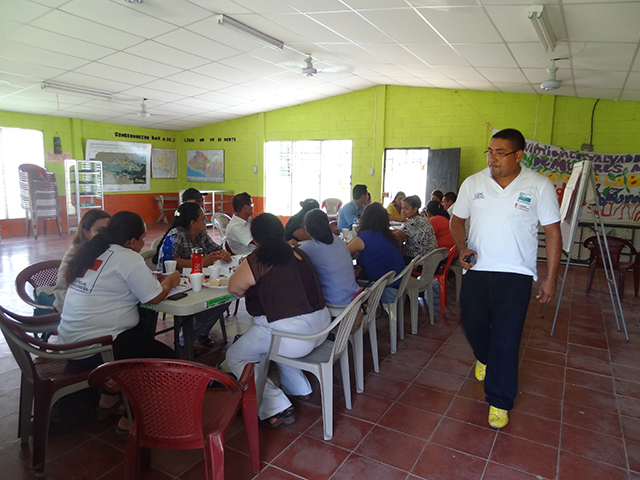 Residents and representatives from the clinic attend the monthly meeting of the local ADESCO’s Health Committee in Ciudad Romero. (Photo: Emma Lawlor)
Residents and representatives from the clinic attend the monthly meeting of the local ADESCO’s Health Committee in Ciudad Romero. (Photo: Emma Lawlor)
The Lower Lempa has been the launching point for a number of these efforts, due to the region’s high rates of CKD as well as its strong local tradition of social mobilization and organization. “There is something very positive in these communities,” former Minister of Health Dra. Maria Isabel Rodriguez told me, speaking of MINSAL’s productive collaborations around CKD in the Lower Lempa.
For example, by coordinating with the Mangrove Association, local ADESCOs, and other community members, MINSAL carried out an extensive clinical and environmental health study called NefroLempa in the region from 2009 to 2013, the first to document the extent of CKD in El Salvador. The study’s results also led to theopening of a clinic in Ciudad Romero in 2013 that specializes in renal care. Although part of MINSAL’s nationwide clinic network, the Specialized Community and Family Health Unit “Monseñor Oscar Arnulfo Romero” is the only local health clinic in Central America constructed specifically tomeet the needs of those affected by the emerging rural CKD epidemic.
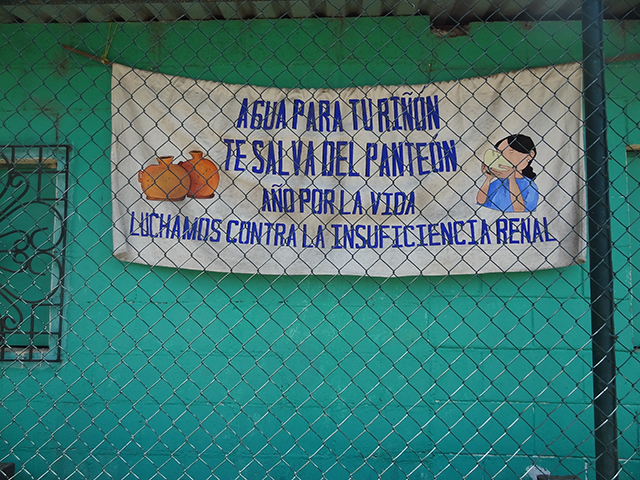 A rhyming banner in Zamorán reads “Water for your kidneys / Saves you from the cemetery / The Year for Life / Let’s fight against kidney disease.” (Photo: Emma Lawlor)
A rhyming banner in Zamorán reads “Water for your kidneys / Saves you from the cemetery / The Year for Life / Let’s fight against kidney disease.” (Photo: Emma Lawlor)
The clinic is the first step in MINSAL’s goal to decentralize CKD medical care to better meet the needs of rural residents. Although the clinic is equipped with dialysis machines, there have been no funds to operate them. The clinic also employs a team of medical specialists trained in renal health, including a nephrologist, a psychologist, a dietician, a health educator, and health promoters from surrounding communities.
The presence of the clinic in Romero, and the growing body of information on the disease, are beginning to give people living with CKD in the Lower Lempa more options and resources. The specialized renal team at the clinic is promoting new practices related not only to diet, medication, and regular medical checkups, but also toreduced agrochemical application and use of protective gear. Local entities like the Mangrove Association and the Jiquilisco town council are also integrating results from the NefroLempa study about emerging links betweenagrochemical exposure and renal impairment into existing efforts to promote small-scale organic agriculture and regulate production practices in the sugarcane industry.
Changing to organic farming practices, however, is difficult. One Ministry of Environment (MARN) employee described to me how farmers with CKD are often stuck in an “alleyway” of chemical intensive production that appears tohave no way out. Many farmers I interviewed living with CKD in the Lower Lempa echoed this sentiment. They suspect agrochemicals are making them sick, yet feel they need them to remain economically competitive. Likewise, in the Lower Lempa’s checkered agricultural landscape, a person can farm without chemicals and follow all medical recommendations and still be exposed to agrochemicals drifting in the wind or seeping into the groundwater from a neighboring sugarcane plantation.
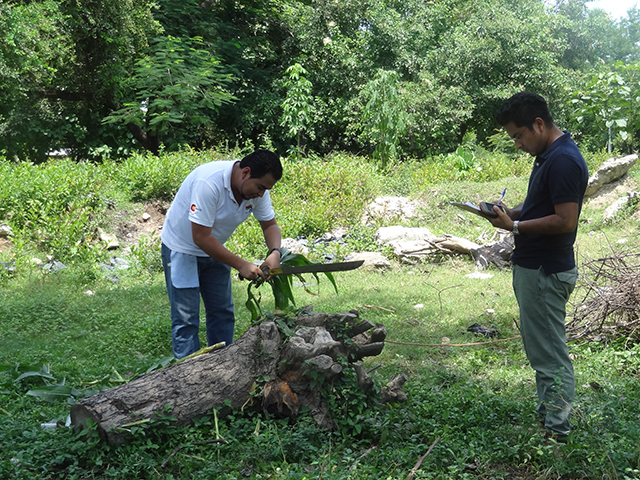 Environmental health researchers from the renal research team at MINSAL’s National Institute of Health take samples in Ciudad Romero, August 2014. (Photo: Emma Lawlor)
Environmental health researchers from the renal research team at MINSAL’s National Institute of Health take samples in Ciudad Romero, August 2014. (Photo: Emma Lawlor)
The metaphor of Salvadoran farmers being stuck in an alleyway points to the systemic obstacles that will need to be overcome in order to redirect agricultural production toward a form that better supports the health and economic well-being of Salvadorans. My research suggests that new medical technologies and changes in labor and chemical-use practices in scattered milpas are important first steps toward addressing CKD. And they are steps not yet being taken in other parts of Central America. Yet, they will not be enough to significantly impact the scale and pace of the growing CKD epidemic. As a result, ongoing efforts in the Lower Lempa to tie CKD to the need for broader reform of El Salvador’s agricultural system are critical.
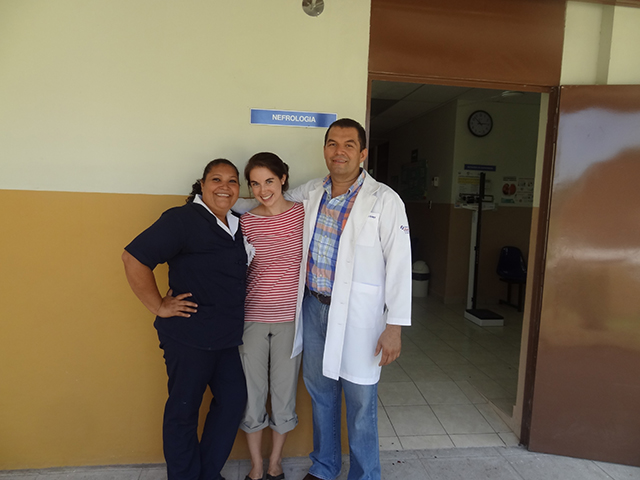 Emma with with renal nurse Tina Turcios and clinic nephrologist Dr. Amaya at the specialized clinic in Ciudad Romero. (Photo: Emma Lawlor)
Emma with with renal nurse Tina Turcios and clinic nephrologist Dr. Amaya at the specialized clinic in Ciudad Romero. (Photo: Emma Lawlor)
Such efforts include the Mangrove Association’s recent collaboration with the Jiquilisco town council to create a local sugarcane production ordinance. Even though many people who have never cut sugarcane are sick with CKD in the Lower Lempa, the sugar industry indirectly shapes a number of dynamics that impact renal health across the region. Pre-harvest cane burning and chemical-application practices are linked to environmental contamination beyond the borders of cane fields. Sugarcane workers face distinctive challenges in accessing medical care and changing labor practices (as has been seen most visibly in Nicaragua), yet only a handful of the more than 7,000 sugar producers in El Salvador have implemented workplace interventions around CKD. As sugarcane production continues to expand in the region, the industry will increasingly shape the political economy in which all farmers in the Lower Lempa must balance making a living and protecting their health.
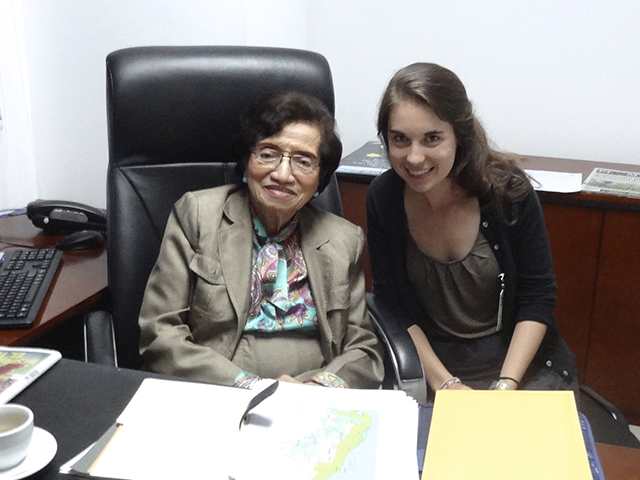 Interviewing Salvadoran Minister of Health from 2009 to 2014, Dr. María Isabel Rodríguez, at the Presidential Palace in San Salvador. (Photo: Emma Lawlor)
Interviewing Salvadoran Minister of Health from 2009 to 2014, Dr. María Isabel Rodríguez, at the Presidential Palace in San Salvador. (Photo: Emma Lawlor)
The scientific evidence is still emerging behind agrochemicals’ linksto CKD, but the stakes are too high to not act on precautionary principle. As former Minister of Health Rodriguez has said, “Are we going to let these people be exposed to chemicals which could be contaminating their land and water? Are we going to forgo regulation while more evidence is amassed? In my opinion we need to enact control measures now. CKDu [chronic kidney disease of an unknown origin] is an urgent health problem – it demands an urgent response.”
In the Lower Lempa, this urgent response is already underway. As I finish my master’s degree in geography this semester at the University of Arizona and move onto doctoral research, I will continue collaborating with local actors including the Mangrove Association and the Romero clinic in their efforts to understand, address, and prevent CKD.
A terrifying moment. We appeal for your support.
In the last weeks, we have witnessed an authoritarian assault on communities in Minnesota and across the nation.
The need for truthful, grassroots reporting is urgent at this cataclysmic historical moment. Yet, Trump-aligned billionaires and other allies have taken over many legacy media outlets — the culmination of a decades-long campaign to place control of the narrative into the hands of the political right.
We refuse to let Trump’s blatant propaganda machine go unchecked. Untethered to corporate ownership or advertisers, Truthout remains fearless in our reporting and our determination to use journalism as a tool for justice.
But we need your help just to fund our basic expenses. Over 80 percent of Truthout’s funding comes from small individual donations from our community of readers, and over a third of our total budget is supported by recurring monthly donors.
Truthout has launched a fundraiser to add 379 new monthly donors in the next 6 days. Whether you can make a small monthly donation or a larger one-time gift, Truthout only works with your support.